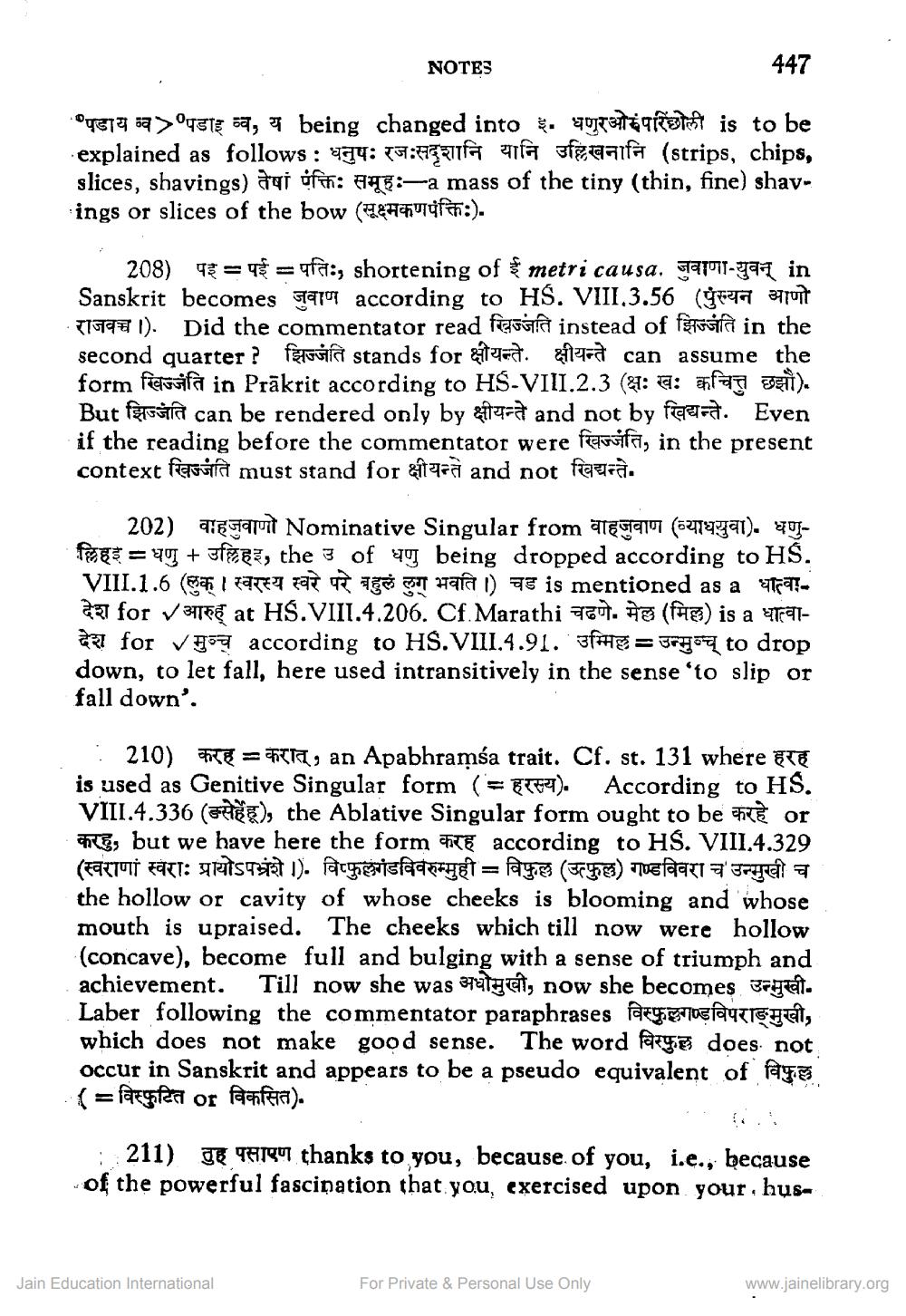________________
NOTES
447
पडाय व >°पडाइ व्व, य being changed into ३. धणुरओरंपरिछोली is to be explained as follows : धनुषः रजःसदृशानि यानि उल्लिखनानि (strips, chips, slices, shavings) तेषां पंक्तिः समूहः-a mass of the tiny (thin, fine) shav'ings or slices of the bow (सूक्ष्मकणपंक्तिः ).
208) पई - पई = पतिः, shortening of ई metri causa. जुवाणा-युवन् in Sanskrit becomes जुवाण according to HS. VIII.3.56 (पुंस्यन आणो राजवञ्च ।). Did the commentator read खिज्जति instead of झिज्जति in the second quarter? झिज्जंति stands for क्षीयन्ते. क्षीयन्ते can assume the form खिज्जति in Prakrit according to HS-VIII.2.3 (क्षः खः क्वचित्तु छझौं). But झिज्जति can be rendered only by क्षीयन्ते and not by खिद्यन्ते. Even if the reading before the commentator were fawuifa, in the present context खिज्जति must stand for क्षीयन्ते and not खिद्यन्ते.
202) वाहजुवाणो Nominative Singular from वाहजुवाण (व्याधयुवा). धणुल्लिहई = धणु + उल्लिहइ, the उ of धणु being dropped according to HS.
VIII.1.6 (लुक् । स्वरस्य स्वरे परे बहुलं लुग भवति ।) चड is mentioned as a धात्वादेश for / आरुह् at HS.VIII.4.206. Cf Marathi चढणे. मेल्ल (मिल्ल) is a धात्वादेश for /मुञ्च according to HS.VIII.4.91. उम्मिल्ल = उन्मुन्च् to drop down, to let fall, here used intransitively in the sense 'to slip or fall down'.
210) करह = करात् , an Apabhramsa trait. Cf. st. 131 where हरह is used as Genitive Singular form (= हरस्य). According to HS.
VIII.4.336 (सेहेंहू), the Ablative Singular form ought to be करहे or करहु, but we have here the form करह according to HS. VIII.4.329 (स्वराणां स्वराः प्रायोऽपभ्रंशे ।). विष्फुल्लगंडविवरुम्मुही = विफुल्ल (उत्फुल) गण्डविवरा च' उन्मुखी च the hollow or cavity of whose cheeks is blooming and whose mouth is upraised. The cheeks which till now were hollow (concave), become full and bulging with a sense of triumph and achievement. Till now she was अधोमुखी, now she becomes उन्मुखी. Laber following the commentator paraphrases विस्फुल्लगण्डविपराङ्मुखी, which does not make good sense. The word Faye does not occur in Sanskrit and appears to be a pseudo equivalent of fays (= विस्फुटित or विकसित).
: 211) तुह पसारण thanks to you, because.of you, i.e., because of the powerful fascination that you, exercised upon your, hus
Jain Education International
For Private & Personal Use Only
www.jainelibrary.org




